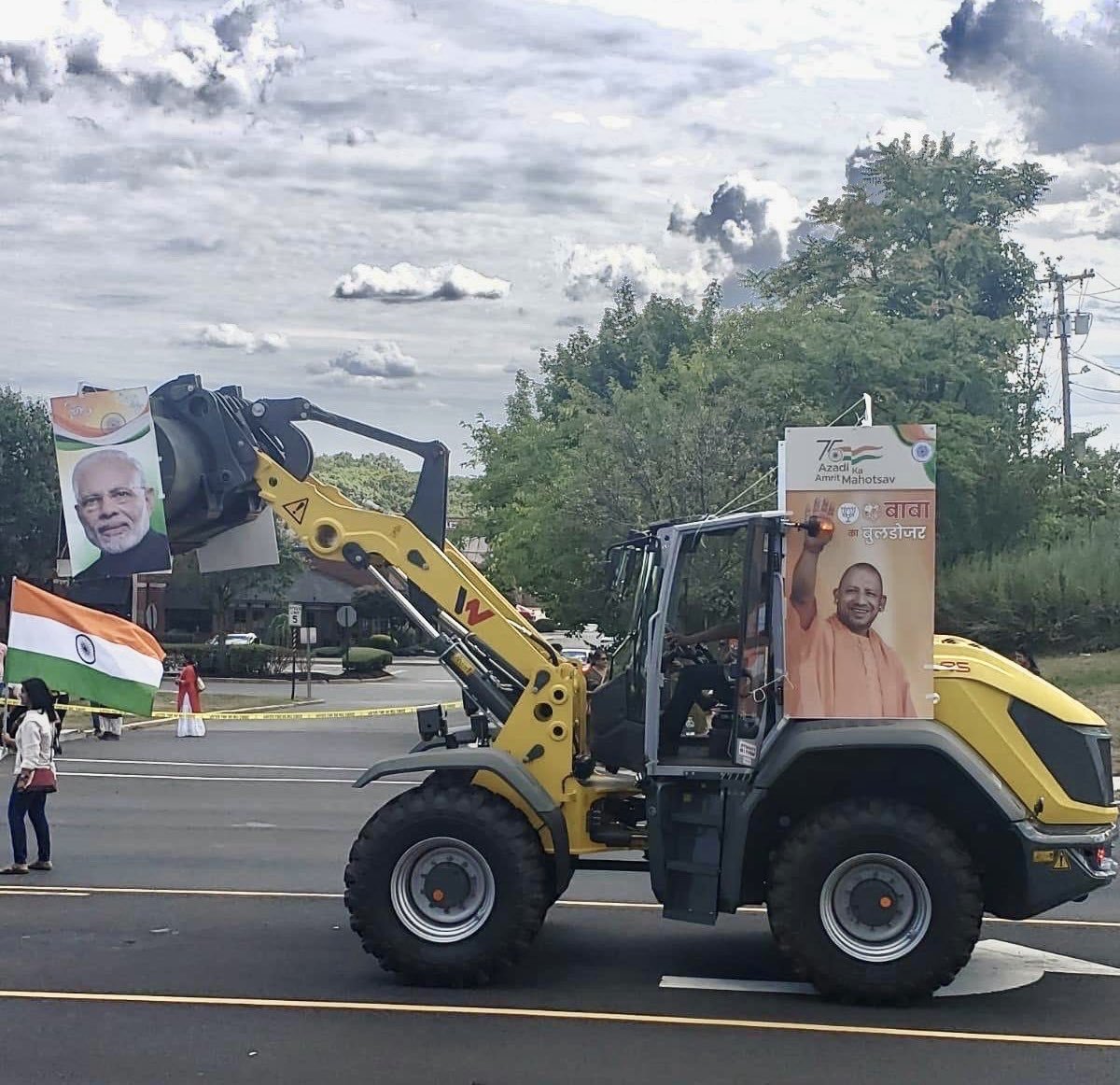The Edison bulldozer scandal is a wake-up call for people to learn about Hindutva hate | Opinion
A bulldozer—celebrating far-right Hindu nationalist violence against Muslims—drove through the streets of Edison, New Jersey in mid-August 2022 at an Indian Independence Day parade. Many New Jersey politicians were present and claim to have been unaware of the bulldozer’s appalling symbolism of praising, even encouraging, the violent oppression of Indian religious minorities.
The backlash is continuing to grow, including calls for the organizers to be held accountable (they apologized on August 30, following weeks of pressure) and for more people to learn about Hindutva hate.
For many New Jerseyans, the Edison bulldozer scandal is the first time that they have heard about the intolerant ideology of Hindu nationalism, also known as Hindutva or Hindu supremacy. But it is unlikely to be the last time. I have been studying global Hindu nationalism for years, including a recent focus on Hindu Right goals and tactics in the United States. America especially New Jersey, is a stronghold for Hindu nationalist groups who provide financial support and ideological guidance for the larger global movement. This extremist ideology—which has roots in early twentieth-century European fascism—has flourished for decades, largely unchecked, in our state, and has had many harmful consequences.
Hindu nationalists propagate their intolerant ideas in the United States through a network of organizations. Some of the most common include the Hindu Swayamsevak Sangh (HSS), the Vishwa Hindu Parishad-America (VHPA), and the Hindu Students Council (HSC). Sometimes a Hindu nationalist group registers as a foreign agent, such as Overseas Friends of BJP, which promotes the interests of India’s far-right ruling party. More commonly, Hindu nationalist groups try to spread and normalize their extremist ideas under the ruse of promoting Indian culture, such as at the Edison parade.
In the recent parade, the celebration of human rights violations was merely symbolic, but it is sometimes far more visceral for New Jersey communities. In 2021, federal agents raided a Hindu temple in Robbinsville, New Jersey and found Dalit men—who are at the bottom of a hierarchy of social oppression known as the caste system—held in bonded labor. Governor Murphy joined the many who condemned the “horrific, unfathomable” conditions of modern-day slavery. What he did not note is that the Hindu temple, part of the BAPS denomination, has strong ties with India’s Hindu nationalist BJP government. As of now, a case is pending in federal court in New Jersey that accuses BAPS of human trafficking in multiple states.
Hindu nationalists regularly attack lots of people—including Dalits, Christians, and the many Hindus who oppose Hindutva—but Muslims are their most common targets. In India, Muslims are subjected to daily violence and harassment, an abysmal situation documented by human rights groups such as Amnesty International, Human Rights Watch, and the United States International Commission on Religious Freedom (USCIRF). In 2022, USCIRF recommended India for sanctions for the third year in a row due to rapidly worsening conditions in the country, especially attacks on Muslims.
Here in New Jersey, Indian Muslims are mainly safe from Hindu nationalist violence, although not always. In 2019, the Rutgers-New Brunswick Hindu Students Council—a Hindu nationalist group—invited a Hindutva demagogue from India to speak. The off-campus event featured Islamophobic hate speech. It also involved a recent Rutgers-Newark alum—and Kashmiri Muslim—being heckled and physically assaulted by others present. At the time, few noticed beyond the South Asian American community, but it is one brick in a larger edifice of anti-minority, Hindu nationalist hate.
At a meeting of the Edison city council on August 22, 2022, a councilmember applauded the activists who had called out the parade bulldozer as a hate symbol: “By you bringing this to our attention, it stops it from going forward... what you’re doing today by bringing awareness is the first step, and that’s the strong step that needs to be done. You’re educating us.” I appreciate his words. But I wonder if he and the other councilmembers have any idea what that education often costs those brave enough to speak.
US-based Hindu nationalists regularly attack South Asian community groups, such as the Indian American Muslim Council (IAMC), which has been active on the bulldozer issue. They smear individual members and spread Islamophobic rumors about entire organizations, such as when the far-right Hindu American Foundation and its allies attacked IAMC last year. Hindu Right attacks in the United States can put one’s family at risk and even require the use of safe houses.
As a professor who works on Hindu nationalism, I am also subjected to regular Hindu nationalist attacks. I often require armed protection when I speak publicly in America, due to the threat of Hindu supremacist violence. While law enforcement has kept me safe thus far, it has not stemmed the waves of hate unleashed against me and Rutgers, my employer. Hindu nationalists are part of the Global Far Right, and so we sometimes see bleed over ideas, such as the anti-black racism lobbed against Rutgers administrators, including President Jonathan Holloway, in a recent propaganda piece by a Hindu nationalist.
Anti-Asian hate crimes are growing in New Jersey. By targeting South Asian Muslims and Dalits, as well as Hindus who disagree with them, Hindu nationalists in the United States are contributing to that alarming trend. If we are to confront and begin to counter such hateful assaults, we must recognize Hindutva’s deep roots and long-standing harms in New Jersey.
A hard truth is that while many New Jerseyans are only now learning the basics of Hindu nationalism, many of our state’s minority communities—especially South Asian Muslims—have lived for decades with spectre of fear and intimidation imposed by purveyors of this intolerant ideology. It is time for that era to end, and for us to say together – Hindutva Hate has no Home in New Jersey.
This opinion piece was published in the New Jersey Star-Ledger on September 2, 2022.
